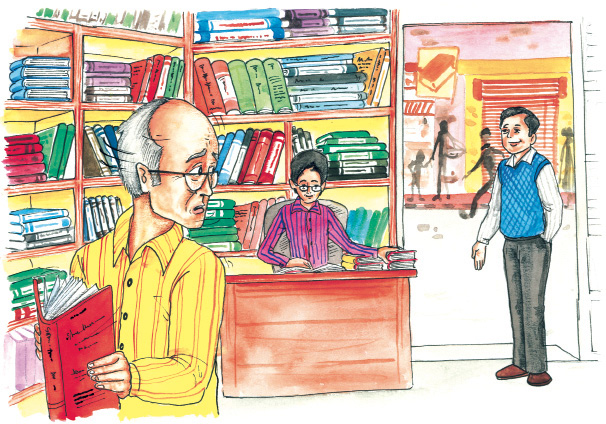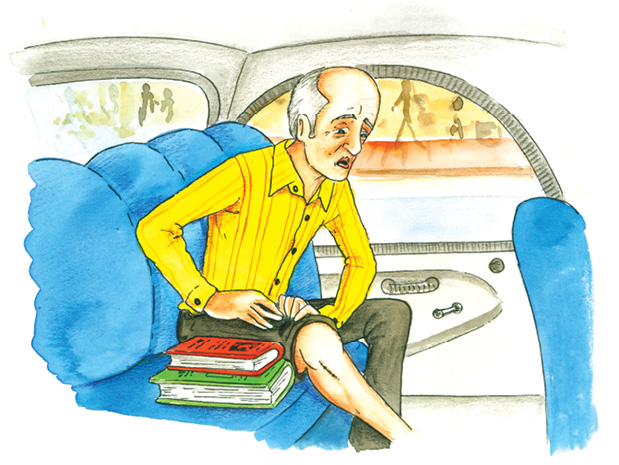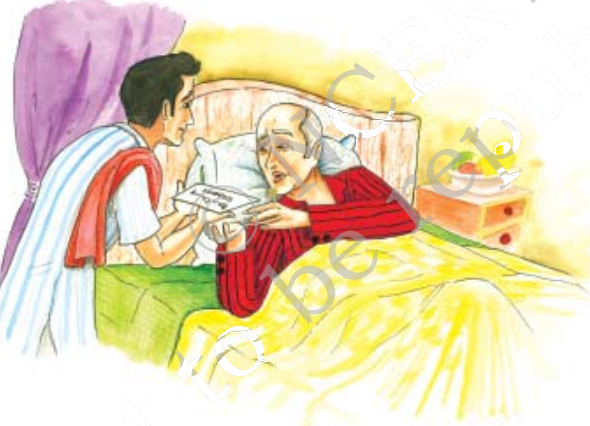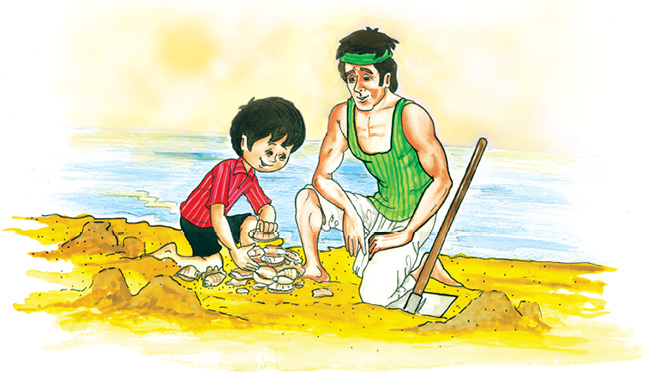Read Lesson - Bepin Choudhury’s Lapse of Memory
1. Chapter 4

Before you read
Do you have a good memory? Has your memory ever played any tricks on you?
Forgetfulness often puts you in a tight spot. But forgetting a part of your life completely may drive you crazy. In this story, Bepin Babu goes nearly crazy because he cannot recollect his stay at Ranchi. He has never been to Ranchi, he insists, though there are many witnesses to the contrary. What is the suspense all about?
I
Every Monday, on his way back from work, Bepin Choudhury would drop in at Kalicharan’s in New Market to buy books. Crime stories, ghost stories and thrillers. He had to buy at least five at a time to last him through the week. He lived alone, was not a good mixer, had few friends, and didn’t like spending time in idle chat. Today, at Kalicharan’s, Bepin Babu had the feeling that someone was observing him from close quarters. He turned round and found himself looking at a round faced, meek looking man who now broke into a smile.
idle chat: unnecessary, routine conversation
meek: quiet; humble
“I don’t suppose you recognise me.”
“Have we met before?” asked Bepin Babu.
The man looked greatly surprised. “We met every day for a whole week. I arranged for a car to take you to the Hudroo falls.

In 1958. In Ranchi. My name is Parimal Ghose.”
“Ranchi?”
Now Bepin Babu realised that it was not he but this man who was making a mistake. Bepin Babu had never been to Ranchi. He had been at the point of going several times, but never made it. He smiled and said, “Do you know who I am?”
The man raised his eyebrows, bit his tongue and said, “Do I know you? Who doesn’t know Bepin Choudhury?”
Bepin Babu now turned towards the bookshelves and said, “Still you’re making a mistake. One often does. I’ve never been to Ranchi.”
The man now laughed aloud.
“What are you saying, Mr Choudhury? You had a fall in Hudroo and cut your right knee. I brought you iodine. I had fixed up a car for you to go to Netarhat the next day, but you couldn’t because of the pain in the knee. Can’t you recall anything? Someone else you know was also in Ranchi at that time. Mr Dinesh Mukerji. You stayed in a bungalow. You said you didn’t like hotel food and would prefer to have your meals cooked by a bawarchi. Mr Mukerji stayed with his sister. You had a big argument about the moon landing, remember? I’ll tell you more: you always carried a bag with your books in it on your sight-seeing trips. Am I right or not?”
Bepin Babu spoke quietly, his eyes still on the books.
“Which month in ’58 are you talking about?”
The man said, “October.”
“No, sir,” said Bepin Babu. “I spent Puja in ’58 with a friend in Kanpur. You’re making a mistake. Good day.”
But the man didn’t go, nor did he stop talking.
“Very strange. One evening I had tea with you in a veranda of your bungalow. You spoke about your family. You said you had no children, and that you had lost your wife ten years ago. Your only brother had died insane, which is why you didn’t want to visit the mental hospital in Ranchi...”
When Bepin Babu had paid for the books and was leaving the shop, the man was still looking at him in utter disbelief.
utter disbelief: complete surprise
(his) head reeled: he was shocked and confused
Comprehension Check
1. Why did the man stare at Bepin Babu in disbelief?
2. Where did Bepin Babu say he went in October ‘58?
3. Mention any three (or more) things that Parimal Ghose knew about Bepin Babu.
II
Bepin Babu’s car was safely parked in Bertram Street by the Lighthouse Cinema. He told the driver as he got into the car, “Just drive by the Ganga, will you, Sitaram.” Driving up the Strand Road, Bepin Babu regretted having paid so much attention to the intruder. He had never been to Ranchi — no question about it. It was inconceivable that he should forget such an incident which took place only six or seven years ago. He had an excellent memory. Unless — Bepin Babu’s head reeled.
Was he losing his mind? But how could that be? He was working daily in his office. It was a big firm, and he was doing a responsible job. He wasn’t aware of anything ever going seriously wrong. Only today he spoke for half an hour at an important meeting. And yet...
losing his mind: becoming mad
intimate: very personal and private
And yet the man knew a great deal about him. How? He even seemed to know some intimate details. The bag of books, wife’s death, brother’s insanity... The only mistake was about his having gone to Ranchi. Not a mistake; a deliberate lie. In ’58, during the Pujas, he was in Kanpur at his friend Haridas Bagchi’s place.
All Bepin Babu had to do was write to — no, there was no way of writing to Haridas. Bepin Babu suddenly remembered that Haridas had left with his wife for Japan some weeks ago, and he didn’t have his address.
But where was the need for proof? He himself was fully aware that he hadn’t been to Ranchi — and that was that.
bracing : stimulating
The river breeze was bracing, and yet a slight discomfort lingered in Bepin Babu’s mind.
Around Hastings, Bepin Babu decided to roll up his trousers and take a look at his right knee.

There was the mark of an old inch-long cut. It was impossible to tell when the injury had occurred.
Had he never had a fall as a boy and cut his knee? He tried to recall such an incident, but couldn’t.
Then Bepin Babu suddenly thought of Dinesh Mukerji. The man had said that Dinesh was in Ranchi at the same time. The best thing surely would be to ask him. He lived quite near — in Beninandan Street. What about going right now? But then, if he had really never been to Ranchi, what would Dinesh think if Bepin Babu asked for a confirmation? He would probably conclude Bepin Babu was going nuts. No; it would be ridiculous to ask him.
going nuts : going mad/crazy
getting into people’s hair : interfering with and annoying people.
And he knew how ruthless Dinesh’s sarcasm could be.
Sipping a cold drink in his air-conditioned living room, Bepin Babu felt at ease again. Such a nuisance! Just because they have nothing else to do, they go about getting into other people’s hair.
After dinner, snuggling in bed with one of the new thrillers, Bepin Babu forgot all about the man in New Market.
Next day, in the office, Bepin Babu noticed that with every passing hour, the previous day’s encounter was occupying more and more of his mind. If the man knew so much about Bepin Babu, how could he make such a mistake about the Ranchi trip?
Just before lunch Bepin Babu decided to ring up Dinesh Mukerji. It was better to settle the question over the phone; at least the embarrassment on his face wouldn’t show.
Two-Three-Five-Six-One-Six. Bepin Babu dialled the number.
“Hallo.”
“Is that Dinesh? This is Bepin here.”
“Well, well — what’s the news?”
“I just wanted to find out if you recalled an incident which took place in ’58.”
“’58? What incident?”
“Were you in Calcutta right through that year? That’s the first thing I’ve got to know.”
“Wait just a minute... ’58... just let me check in my diary.”
For a minute there was silence. Bepin Babu could feel that his heartbeat had gone up. He was sweating a little.
“Hallo.”
“Yes.”
“I’ve got it. I’d been out twice.”
“Where?”
“Once in February — nearby — to Krishnanagar to a nephew’s wedding. And then... but you’d know about this one. The trip to Ranchi. You were there too. That’s all. But what’s all this sleuthing about?”
“No. I just wanted to — anyway, thanks.”
sleuthing: investigating (an event)
Bepin Babu slammed the receiver down and gripped his head with his hands. He felt his head swimming. A chill seemed to spread over his body. There were sandwiches in his tiffin box, but he didn’t eat them. He had lost his appetite.
Comprehension Check
1. Why did Bepin Babu worry about what Parimal Ghose had said?
2. How did he try to decide who was right—his memory or Parimal Ghose?
3. Why did Bepin Babu hesitate to visit Mr Mukerji? Why did he finally decide to phone him?
4. What did Mr Mukerji say? Did it comfort Bepin Babu, or add to his worries?
III
After lunch-time, Bepin Babu realised that he couldn’t possibly carry on sitting at his desk and working. This had never happened in the twenty-five years he had been with the firm. He had a reputation for being a tireless, conscientious worker. But today his head was in a whirl.
carry on: continue
conscientious: careful and correct
head was in a whirl: (here) confused and unable to think clearly
gather his wits together: make an effort to become calm and think clearly
having a rough time: having a lot of problems
turning up like a bad penny: appearing at a place where one is not welcome
didn’t beat about the bush: came straight to the point
off and on: now and then
throw your mind back: think back and recall a past event
Back home at two-thirty, Bepin Babu lay down in bed and tried to gather his wits together. He knew that it was possible to lose one’s memory through an injury in the head, but he didn’t know of a single instance of someone remembering everything except one particular incident — and a fairly recent and significant one at that. He had always wanted to go to Ranchi; to have gone there, done things, and not to remember was something utterly impossible.
At seven thirty, Bepin Babu’s servant came and announced, “Chuni Babu, sir. Says it’s very important.”
Bepin Babu knew what Chuni had come for. Chunilal had been at school with him. He’d been having a rough time lately and had been coming to see him about a job. Bepin Babu knew it was not possible to do anything for him and, in fact, told him so. But Chuni kept turning up like a bad penny.
Bepin Babu sent word that not only was it not possible for him to see Chuni now, but not in several weeks.
But as soon as the servant stepped out of the room, it struck Bepin Babu that Chuni might remember something about the ’58 trip. There was no harm in asking him.
Bepin Babu hurried down the stairs and into the living room. Chuni was about to leave, but seeing Bepin Babu appear, he turned round hopefully.
Bepin Babu didn’t beat about the bush.
“Listen, Chuni - I want to ask you something. You have a good memory, and you’ve been seeing me off and on for a long time. Just throw your mind back and tell me - did I go to Ranchi in ’58?”
Chuni said, “’58? It must have been ’58. Or was it ’59?”
“You’re sure that I did go to Ranchi?”
Chuni’s look of amazement was not unmixed with worry.
“D’ you mean you have doubts about having gone at all?”
“Did I go? Do you remember clearly?”
Chuni sat down on the sofa, fixed Bepin Babu with a long, hard stare and said, “Bepin, have you taken to drugs or something? As far as I know, you had a clean record where such things were concerned. I know that old friendships don’t mean much to you, but at least you had a good memory. You can’t really mean that you’ve forgotten about the Ranchi trip?”
Bepin Babu had to turn away from Chuni’s incredulous stare.
“Do you remember what my last job was?” asked Chunilal.
“Of course. You worked in a travel agency.”
“You remember that and you don’t remember that it was I who fixed up your railway booking for Ranchi? I went to the station to see you off; one of the fans in your compartment was not working — I got an electrician to fix it. Have you forgotten everything? Whatever is the matter with you? You don’t look too well, you know.”
Bepin Babu sighed and shook his head.
“I’ve been working too hard,” he said at last. “That must be the reason. Must see about consulting a specialist.”
must see about consulting: (here) may have to consult
Paresh Chanda was a young physician with a pair of bright eyes and a sharp nose. He became thoughtful when he heard about Bepin Babu’s symptoms. “Look, Dr Chanda,” said Bepin Babu desperately, “You must cure me of this horrible illness. I can’t tell you how it’s affecting my work.”
Dr Chanda shook his head.
“You know what, Mr Choudhury,” he said. “I’ve never had to deal with a case such as yours. Frankly, this is quite outside my field of experience. But I have one suggestion. I don’t know if it’ll work, but it’s worth a try. It can do no harm.”
Bepin Babu leaned forward anxiously.
“As far as I can make out,” said Dr Chanda, “And I think you’re of the same opinion — you must have been to Ranchi, but due to some unknown reason, the entire episode has slipped out of your mind. What I suggest is that you go to Ranchi once again. The sight of the place may remind you of your trip. This is not impossible. More than that I cannot do at the moment. I’m prescribing a nerve tonic and a tranquilliser. Sleep is essential, or the symptoms will get more pronounced.”
tranquilliser: a medicine to reduce stress and anxiety
procured: got (with a little difficulty)
Bepin Babu felt somewhat better the next morning.
After breakfast, he rang up his office, gave some instructions and then procured a first class ticket for Ranchi for the same evening.
Comprehension Check
1. Who was Chunilal? What did he want from Bepin Babu?
2. Why was Dr Chanda puzzled? What was unusual about Bepin Babu’s loss of memory?
came round: regained consciousness
Next morning, Bepin Babu was back in Calcutta. He realised that there was truly no hope for him. Soon he would lose everything: his will to work, his confidence, his ability, his balance of mind. Was he going to end up in the asylum at...? Bepin Babu couldn’t think any more.
Back home, he rang up Dr Chanda and asked him to come over. Then, after a shower, he got into bed with an ice bag clamped on his head. Just then the servant brought him a letter which someone had left in the letter box. A greenish envelope with his name in red ink on it. Above the name it said ‘Urgent and Confidential’. In spite of his condition, Bepin Babu had a feeling that he ought to go through the letter. He tore open the envelope and took out the letter. This is what he read —

I had no idea that affluence would bring about the kind of change in you that it has done. Was it so difficult for you to help out an old friend down on his luck? I have no money, so my resources are limited.
What I have is imagination, a part of which I used in retribution of your unfeeling behaviour.
Well, you’ll be all right again now. A novel I’ve written is being considered by a publisher. If he likes it enough, it’ll see me through the next few months.
in retribution of: as apunishment for
When Dr Chanda came, Bepin Babu said, “I’m fine. It all came back as soon as I got off the train at Ranchi.”
“A unique case,” said Dr Chanda. “I shall certainly write about it in a medical journal.”
“The reason why I sent for you,” said Bepin Babu, “is that I have a pain in the hip from a fall I had in Ranchi. If you could prescribe a pain killer…”
Satyajit Ray
1. Had Bepin Babu really lost his memory and forgotten all about a trip to Ranchi?
2. Why do you think Chunilal did what he did? Chunilal says he has no money; what is it that he does have?

1. The author describes Bepin Babu as a serious andhardworking man. What evidence can you find in the story to support this?
2. Why did Bepin Babu change hismind about meeting Chunilal? What was the result of thismeeting?
3. Bepin Babu lost consciousness at Hudroo Falls. What do you think was the reason for this?
4. How do you think Bepin Babu reacted when he found out that Chunilal had tricked him?

1. Look at these two sentences.
- He had to buy at least five books to last him through the week.
- Bepin had to ask Chuni to leave.
Fill in the blanks below using ‘had to’/ ‘have to’/ ‘has to’.
(i) I _________ cut my hair every month.
(ii) We _________go for swimming lessons last year.
(iii) She ________________ tell the principal the truth.
(iv) They ________________ take the baby to the doctor.
(v) We ________________ complain to the police about the noise.
(vi) Romit ________________ finish his homework before he could come out to play.
(vii) I ________________ repair my cycle yesterday .
2. Here are a few idioms that you will find in the story. Look for them in the dictionary in the following way.
First, arrange them in the order in which you would find them in a dictionary.
(Clue: An idiom is usually listed under the first noun, verb, adjective or adverb in it. Ignore articles or prepositions in the idiom).
To help you, we have put in bold the word under which you must look for the idiom in the dictionary.)
(i) at/from close quarters (close: adjective)
(ii) break into a smile (break: verb; look under ‘break into something’)
(iii) carry on (carry: verb)
(iv) have a clean record (you may find related meanings under both these words)
(v) beat about the bush (verb)
Now refer to your dictionary and find out what they mean.

(ii) Which column suggests that Chunilal is now waiting for a reply from the publisher?
(iii) Which column suggests that the person still remembers the movie he saw?
(iv) Which column suggests that the experience of visiting Ranchi is still fresh in the speaker’s mind?
4. Given below are jumbled sentences. Working in groups, rearrange the words in each sentence to form correct sentences.
You will find that each sentence contains an idiomatic expression that you have come across in the lesson. Underline the idiom and write down its meaning. Then use your dictionary to check the meaning.
One sentence has been worked out for you as an example.
Jumbled sentence: vanished/ The car/ seemed to/ into thin/ have/ air.
Ans:The car seemed to have vanished into thin air.
Idiom:vanished into thin air: disappeared or vanished in a mysterious way
(i) Stop/and tell me/beating about/what you want/the bush
Ans: ______
Idiom: _____
(ii) don’t pay/If you/ attention/you might/the wrong train/to the announcement/board
Ans:______
(iv) Bepin Babu/orders to/telling people/under/loved/doctor’s/eat early/that he was
Ans: ______
Idiom:______
(v) the students/The teacher/his eyebrows/when/said that/all their lessons/raised/they had revised
Ans: _______

1. What do you think happened after Bepin Babu came to know the truth? Was he angry with this friend for playing such a trick on him? Or do you think he decided to help a friend in need?
2. Imagine you are Bepin Choudhury. You have received Chunilal’s letter and feel ashamed that you did not bother to help an old friend down on his luck. Now you want to do something for him. Write a letter to Chunilal promising to help him soon.
Or
A prank is a childish trick. Do you remember any incident when someone played a prank on you or your friends? Describe the prank in a paragraph.
There was an old woman
Who lived under a hill,
And if she’s not gone
She lives there still.

A bargain is an agreement in which both parties promise to do something for each other. Someone is looking for work, waiting to be hired. He strikes a bargain but thinks it worthless. He tries twice again but doesn’t like either. Finally, in the last bargain, when he is hired for nothing whatever, he is happy as never before. What is the bargain, and why is it the best?

“Come and hire me,” I cried, while in the morning
I was walking on the stone-paved road.
Sword in hand the King came in his chariot.
He held my hand and said, “I will hire you with my power,”
But his power counted for naught, and he went away in his chariot.
In the heat of the mid-day the houses stood with shut doors.
I wandered along the crooked lane.
An old man came out with his bag of gold.
He pondered and said, “I will hire you with my money.”
He weighed his coins one by one, but I turned away.
It was evening. The garden hedge was all aflower.
The fair maid came out and said, “I will hire you with a smile.”
Her smile paled and melted into tears, and she went back alone into the dark.
The sun glistened on the sand, and the sea waves broke waywardly.
A child sat playing with shells.
He raised his head and seemed to know me and said,
“I hire you with nothing.”
From henceforward that bargain struck in child’s play made me a free man.
RABINDRANATH TAGORE
